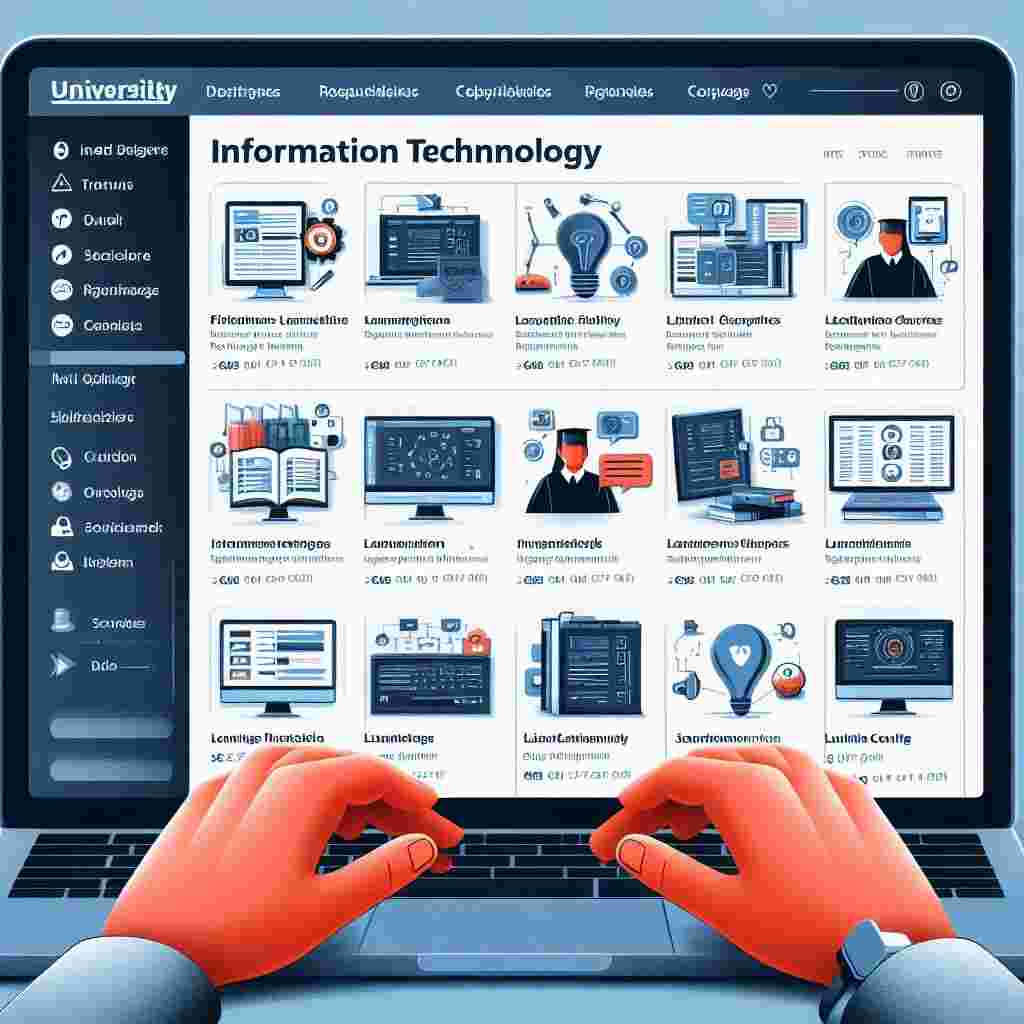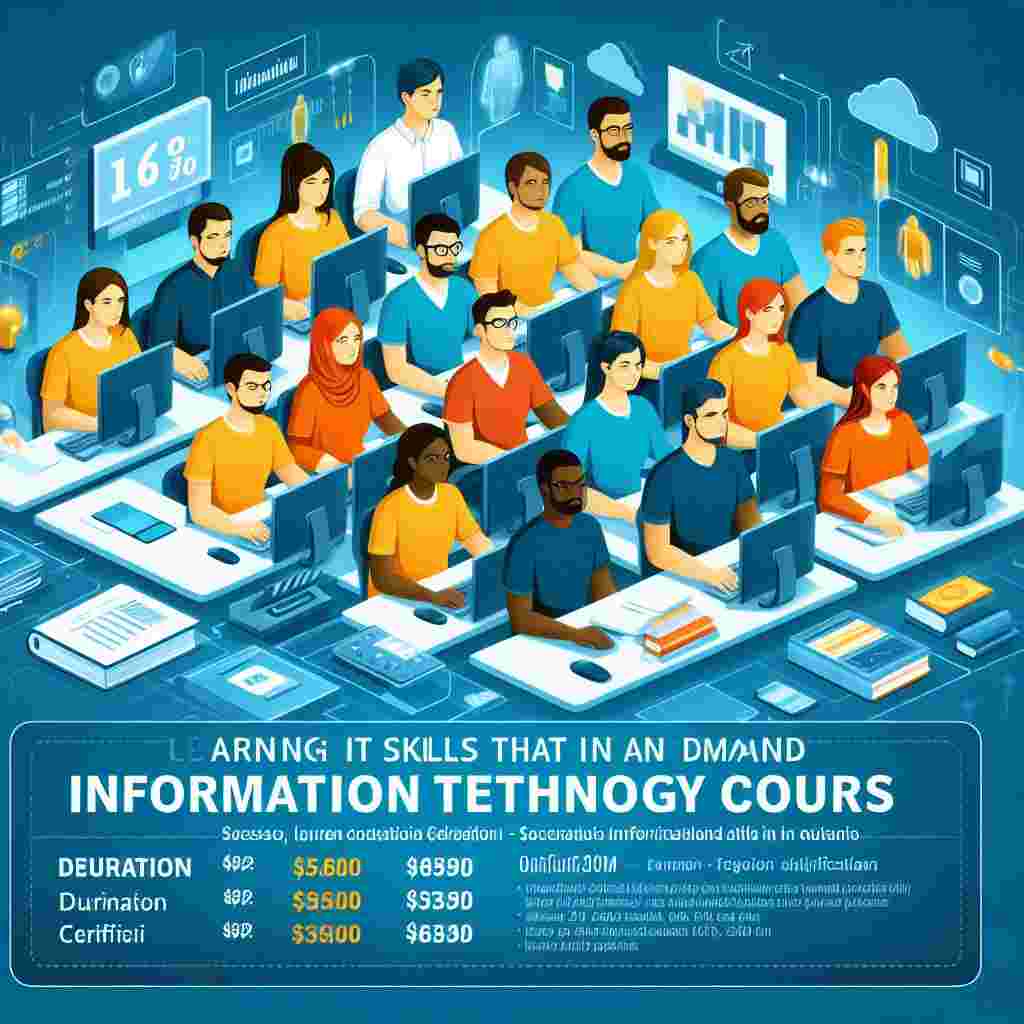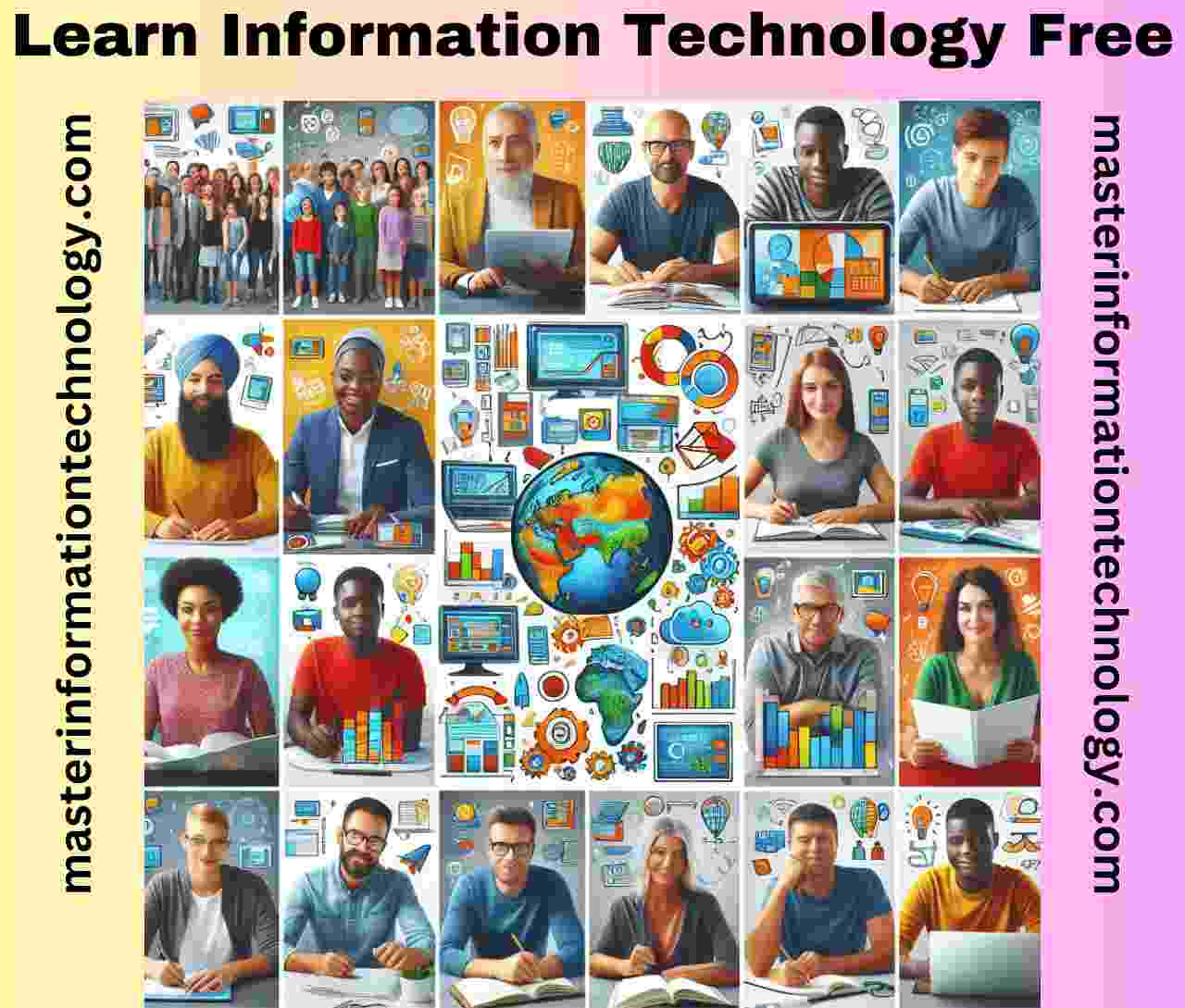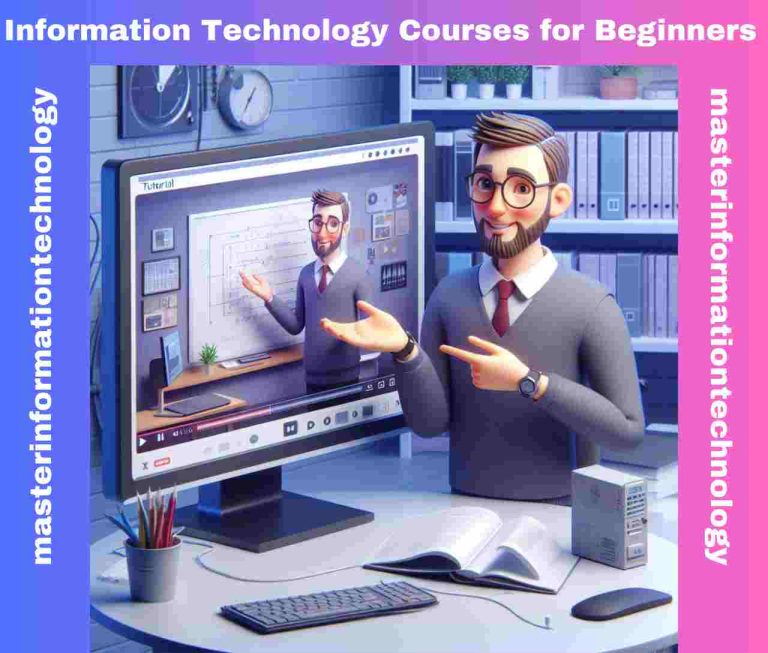Learn Information Technology Free
In today’s digitally-driven world, proficiency in Information Technology (IT) is no longer a luxury but a necessity. Whether you’re aiming to enhance your career prospects, delve into the realms of coding and programming, or simply satisfy your curiosity about the digital landscape, learning IT skills is paramount. The good news? You can embark on this journey without breaking the bank. Here’s how to learn Information Technology for free.👨🏻🎓💻👨💻
- Online Courses and Tutorials
The internet is a treasure trove of free resources waiting to be explored. Platforms like Coursera, edX, and Khan Academy offer a myriad of IT courses covering topics ranging from basic computer literacy to advanced programming languages like Python and Java. These courses often come with video lectures, interactive quizzes, and assignments to facilitate comprehensive learning.
- Open Educational Resources (OER)
OER platforms such as MIT OpenCourseWare and OpenStax provide access to textbooks, lecture notes, and other educational materials at no cost. Whether you’re interested in networking, cybersecurity, or database management, you can find valuable resources curated by experts in the field.
- YouTube Tutorials and Channels
YouTube is a goldmine for IT enthusiasts, with countless channels dedicated to teaching programming languages, software development, web design, and more. From beginner-friendly tutorials to in-depth coding projects, you can find content tailored to your learning pace and preferences.
- Coding Bootcamps and Hackathons
Participating in coding boot camps and hackathons is an excellent way to hone your IT skills while collaborating with like-minded individuals. Many organizations host free boot camps and coding competitions that provide hands-on experience and networking opportunities.
- Community College and Library Resources
Don’t overlook the resources available at your local community college or library. Many institutions offer free or low-cost IT courses, workshops, and access to specialized software and tools. Additionally, libraries often host tech meetups and study groups where you can connect with peers and mentors.
- Online Forums and Communities
Joining online forums and communities such as Stack Overflow, Reddit’s r/learnprogramming, and GitHub can provide invaluable support and guidance as you navigate your IT learning journey. These platforms offer opportunities to ask questions, share knowledge, and collaborate on projects with experienced developers and IT professionals.
Free Ebooks and Documentation: Websites like Project Gutenberg and GitHub offer a vast collection of free ebooks and documentation on various IT topics. Whether you’re looking to master a new programming language or delve into the intricacies of cloud computing, you can find comprehensive resources to supplement your learning.
Learning information Technology doesn’t have to come with a hefty price tag. By leveraging the plethora of free resources available online and within your community, you can acquire valuable IT skills and unlock endless opportunities for personal and professional growth. So, what are you waiting for? Dive into the world of IT today and embark on a journey of discovery and innovation.🎖️📚👌
IT Courses Online for Beginners Free

Are you ready to embark on a journey into the dynamic world of Information Technology (IT)? Whether you’re a complete novice or looking to enhance your existing skills, there’s never been a better time to dive into the realm of IT. With an abundance of free online courses tailored for beginners, acquiring fundamental IT knowledge has never been more accessible. Let’s explore some of the top platforms offering free IT courses for beginners.👌✌
Coursera
Coursera partners with leading universities and organizations to offer a wide range of IT courses for beginners. From introductory courses on computer science to specialized tracks in cybersecurity and data analysis, Coursera provides comprehensive learning experiences with video lectures, quizzes, and hands-on projects. Plus, many courses offer a free audit option, allowing you to access course materials at no cost.
edX
Similar to Coursera, edX collaborates with renowned institutions like MIT and Harvard to offer high-quality IT courses for beginners. Whether you’re interested in learning programming languages like Python or exploring the fundamentals of cloud computing, edX provides interactive learning experiences with self-paced courses and verified certificates available for a fee.
Khan Academy
Khan Academy offers a variety of free IT courses designed for beginners of all ages. With engaging video tutorials and practice exercises, Khan Academy covers topics such as computer programming, algorithms, and computer science fundamentals in an accessible and engaging manner. Whether you’re a student or a lifelong learner, Khan Academy provides a platform to explore and master IT concepts at your own pace.
Codecademy
Codecademy specializes in teaching coding and programming skills through interactive coding exercises and projects. With its beginner-friendly approach, Codecademy is an ideal starting point for those with little to no programming experience. From HTML and CSS to JavaScript and Python, Codecademy offers free courses covering a wide range of programming languages and technologies.
SoloLearn
SoloLearn offers a mobile-friendly platform for learning coding and IT skills on the go. With its bite-sized lessons and interactive quizzes, SoloLearn makes learning fun and accessible for beginners. Whether you’re interested in coding languages like Java, C++, or SQL, SoloLearn provides a supportive community and gamified learning experience to help you progress from novice to proficient.
Whether you’re looking to kickstart a career in IT or simply satisfy your curiosity about technology, free online courses provide an excellent opportunity to learn and grow. With platforms like Coursera, edX, Khan Academy, Codecademy, and SoloLearn offering a wealth of resources tailored for beginners, there’s never been a better time to dive into the world of IT. So why wait? Start your journey today and unlock the endless possibilities of Information Technology.🎓🏫🎫
Online IT Courses Free with Certificate

In today’s competitive job market, having the right skills can make all the difference in advancing your career or landing your dream job. Fortunately, the accessibility of online learning has democratized education, allowing individuals from all walks of life to acquire valuable skills without breaking the bank. If you’re looking to enhance your proficiency in Information Technology (IT) and boost your credentials, numerous free online IT courses offer certificates upon completion. Let’s explore how these courses can help you take your career to the next level.
- Coursera
Coursera partners with leading universities and companies to offer a wide range of IT courses, many of which are free to audit. However, if you’re seeking a certificate to showcase your accomplishments, Coursera offers financial aid options and free trials for select courses. With certificates from Coursera, you can demonstrate your expertise in areas such as cybersecurity, cloud computing, and data science, enhancing your employability and credibility in the IT industry.
- edX
Similar to Coursera, edX collaborates with top universities and institutions to provide free IT courses with the option to purchase a certificate. Whether you’re interested in learning programming languages like Python, mastering machine learning concepts, or gaining insights into IT management, edX offers a diverse array of courses to suit your interests and career goals. With certificates from edX, you can showcase your skills and knowledge to prospective employers and colleagues.
- Google IT Support Professional Certificate
Developed by Google and hosted on the Coursera platform, the Google IT Support Professional Certificate is a comprehensive program designed to prepare individuals for entry-level IT support roles. The course covers essential topics such as troubleshooting, customer service, networking, and operating systems. Upon completion, learners receive a certificate endorsed by Google, providing a valuable credential for those pursuing careers in IT support.
- IBM Data Science Professional Certificate
Offered on Coursera, the IBM Data Science Professional Certificate is a series of courses designed to equip learners with the skills and tools needed to pursue a career in data science. From data analysis and visualization to machine learning and AI, this certificate program covers key concepts and techniques used in the field of data science. With a certificate from IBM, you can demonstrate your proficiency in data-driven decision-making and analysis, opening doors to exciting career opportunities.
- Microsoft Learn
Microsoft Learn offers a plethora of free IT courses and learning paths covering Microsoft technologies, cloud computing, cybersecurity, and more. While Microsoft does not offer certificates for individual courses, completing learning paths can earn you badges and certifications that validate your skills and expertise. Whether you’re interested in becoming a Microsoft Certified Azure Developer or a Microsoft Certified Security Engineer, Microsoft Learn provides resources to help you achieve your goals.
Free online IT courses with certificates offer a valuable opportunity to enhance your skills, expand your knowledge, and advance your career prospects. Whether you’re looking to break into the IT industry, upskill for a promotion, or pivot into a new role, these courses provide a flexible and accessible pathway to success. With certificates from reputable platforms like Coursera, edX, Google, IBM, and Microsoft, you can showcase your expertise and stand out in today’s competitive job market. So why wait? Enroll in a free online IT course today and take the first step toward a brighter future.
Related: How to Master Information Technology
Information Technology Courses List

In an ever-evolving digital era, proficiency in Information Technology (IT) has become essential for individuals and businesses alike. Whether you’re a seasoned professional looking to stay ahead of the curve or a novice eager to embark on a learning journey, the world of IT offers a vast array of courses catering to diverse interests and skill levels. Let’s explore a curated list of Information Technology courses that cover a wide range of topics and disciplines.
Computer Science Fundamentals
Begin your IT education journey with foundational courses in computer science. Covering topics such as algorithms, data structures, and computer architecture, these courses provide a solid understanding of the fundamental principles that underpin modern computing systems.
Programming Languages
Dive into the world of programming languages with courses focused on languages like Python, Java, C++, and JavaScript. Whether you’re interested in web development, software engineering, or data science, mastering programming languages is essential for building applications and solving complex problems.
Web Development
Explore the intricacies of web development with courses that cover HTML, CSS, JavaScript, and frameworks like React and Angular. From creating static web pages to building dynamic web applications, these courses provide hands-on experience in designing and developing websites.
Cybersecurity
With the increasing prevalence of cyber threats, cybersecurity has become a critical area of focus for organizations worldwide. Cybersecurity courses cover topics such as network security, ethical hacking, cryptography, and risk management, equipping learners with the knowledge and skills to protect digital assets and mitigate cyber risks.
Data Science and Analytics
Unlock the power of data with courses in data science and analytics. From data collection and analysis to visualization and interpretation, these courses delve into techniques and tools used to derive insights from large datasets. Topics may include machine learning, statistical analysis, and data visualization using platforms like R and Python.
Cloud Computing
Embrace the future of IT infrastructure with courses in cloud computing. Learn about cloud architecture, deployment models, and services offered by leading cloud providers such as Amazon Web Services (AWS), Microsoft Azure, and Google Cloud Platform (GCP). Gain hands-on experience with cloud technologies and prepare for certifications to validate your expertise.
IT Project Management
Develop essential project management skills with courses tailored for IT professionals. Learn about project planning, execution, and monitoring, as well as risk management, stakeholder communication, and agile methodologies. These courses provide valuable insights into managing IT projects effectively and delivering results on time and within budget.
The field of Information Technology offers a wealth of opportunities for learning and growth. Whether you’re interested in programming, cybersecurity, data science, or cloud computing, there’s a course out there to suit your interests and goals. By exploring the diverse range of Information Technology courses available, you can expand your knowledge, enhance your skills, and propel your career forward in the dynamic world of IT.
Information Technology Course Subjects

Information Technology (IT) is a vast and dynamic field that encompasses a wide range of subjects, each playing a crucial role in our increasingly digital world. Whether you’re an aspiring IT professional or simply curious about the intricacies of technology, understanding the various course subjects within IT can help you navigate your learning journey. Let’s delve into some of the key areas of study in information technology courses.
Computer Science Fundamentals
At the core of IT education lies computer science fundamentals. This includes topics such as algorithms, data structures, programming languages, and software development methodologies. Understanding these foundational concepts provides a solid framework for tackling more advanced IT subjects and solving real-world problems.
Networking and Security
Networking and security are essential components of IT infrastructure. Courses in this area cover topics such as network architecture, protocols, routing, firewalls, encryption, and cybersecurity best practices. With cyber threats on the rise, knowledge of networking and security is crucial for safeguarding data and maintaining the integrity of digital systems.
Database Management
Databases are the backbone of modern applications, storing and organizing vast amounts of data. Database management courses teach students how to design, implement, and maintain databases using relational database management systems (RDBMS) like MySQL, PostgreSQL, and Oracle. Students learn SQL (Structured Query Language) to retrieve, manipulate, and analyze data efficiently.
Web Development and Design
In an age where the internet is ubiquitous, web development and design skills are highly sought after. Courses in this area cover HTML, CSS, JavaScript, and other web technologies used to create visually appealing and functional websites. Students also learn about user experience (UX) design, responsive web design, and web accessibility standards.
Cloud Computing
Cloud computing has revolutionized the way organizations store, manage, and access data and applications. Courses in cloud computing introduce students to cloud service models (IaaS, PaaS, SaaS), cloud providers like Amazon Web Services (AWS) and Microsoft Azure, virtualization, containerization, and cloud security.
Data Science and Analytics
With the exponential growth of data, the demand for skilled data scientists and analysts continues to rise. Data science courses cover statistical analysis, machine learning, data visualization, and big data technologies like Hadoop and Spark. Students learn how to extract insights from data to inform decision-making and drive innovation.
Software Engineering and DevOps
Software engineering courses focus on the principles and practices of building scalable and maintainable software systems. Students learn about software development methodologies (e.g., Agile, Scrum), version control systems (e.g., Git), continuous integration and deployment (CI/CD), and collaboration tools used in DevOps environments.
Information technology courses cover a diverse array of subjects, reflecting the multifaceted nature of the IT industry. Whether you’re interested in programming, networking, cybersecurity, web development, or data science, there’s a course out there to suit your interests and career aspirations. By gaining proficiency in these key areas, you can position yourself for success in today’s technology-driven world. So why wait? Start exploring the exciting world of IT course subjects today and unlock endless opportunities for learning and growth.
Information Technology Course Fees

Information Technology (IT) has become an indispensable field in today’s digital age, with a multitude of courses available to help individuals gain proficiency in various IT domains. However, one common concern for prospective learners is the cost associated with these courses. In this article, we’ll delve into the factors influencing IT course fees and provide tips on navigating them effectively.
- Course Type and Duration
The type and duration of the IT course play a significant role in determining the fees. Short-term, introductory courses typically have lower fees compared to comprehensive, specialized programs that span several months or even years. Additionally, courses that lead to certifications or degrees may have higher fees due to the value they offer in terms of career advancement and recognition.
- Institution or Provider
The reputation and accreditation of the institution or provider offering the IT course can influence the fees. Courses from prestigious universities or established online learning platforms may command higher fees due to the quality of education and resources provided. However, there are also reputable organizations that offer free or low-cost IT courses, making quality education accessible to a wider audience.
- Course Content and Resources
The depth and breadth of course content, as well as the resources provided, can impact the fees. Courses that offer hands-on labs, interactive simulations, access to industry-standard software, and personalized support may have higher fees but provide a more comprehensive learning experience. Conversely, courses that rely solely on lecture-based content may be more affordable but may not offer the same level of practical skills development.
- Certification and Accreditation
Courses that lead to industry-recognized certifications or academic accreditation often have higher fees due to the added value they provide. Certifications from reputable organizations such as Cisco, CompTIA, Microsoft, and AWS can significantly enhance your resume and career prospects in the IT field. However, it’s essential to research the credibility and market demand for specific certifications to ensure a good return on investment.
- Financial Aid and Scholarships
Many institutions and organizations offer financial aid, scholarships, or flexible payment options to help learners offset the cost of IT courses. Whether through government grants, employer sponsorships, or merit-based scholarships, exploring these options can make IT education more affordable and accessible to individuals from diverse backgrounds.
- Additional Fees and Expenses
It’s essential to consider any additional fees or expenses associated with the IT course, such as textbooks, exam fees, and software licenses. These costs can add up throughout the course and should be factored into your budgeting and financial planning.
Conclusion
while the cost of IT courses can vary depending on various factors, there are options available to suit every budget and learning need. By carefully researching and comparing course fees, considering financial aid options, and evaluating the value proposition of certifications and accreditation, you can make informed decisions about investing in your IT education. Remember that the skills and knowledge gained from IT courses can lead to lucrative career opportunities and long-term professional growth, making them a worthwhile investment in your future.





